#augments
Explore tagged Tumblr posts
Text
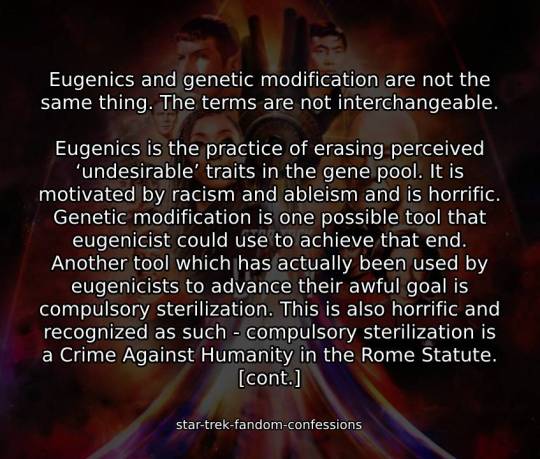
#1145
Eugenics and genetic modification are not the same thing. The terms are not interchangeable. Eugenics is the practice of erasing perceived ‘undesirable’ traits in the gene pool. It is motivated by racism and ableism and is horrific. Genetic modification is one possible tool that eugenicist could use to achieve that end. Another tool which has actually been used by eugenicists to advance their awful goal is compulsory sterilization. This is also horrific and recognized as such - compulsory sterilization is a Crime Against Humanity in the Rome Statute. However, sterilization procedures such as tube tying and vasectomies are not practices that people generally call for to be banned, because people may want to prevent themselves from getting pregnant or from getting another person pregnant for all sorts of reasons and we recognized that people should have autonomy over their own bodies and be free to make their own reproductive choices. Consensual vasectomies and tube tying being legal in a country does not mean that country is endorsing eugenics. A country in which there is a government program of coercing or using incentives to get members groups perceived as undesirable to have their tubes tied or have vasectomies is practicing eugenics. The legality and use of tool in general does not necessarily mean that the tool is being used for eugenics. Now, let’s take that one step further with a hypothetical on genetic engineering. Imagine that we determine that if one gene was removed from the human genome, those without that gene would no longer get dementia and there were zero other impacts. Would a country that made that genetic modification procedure available for free to everyone who wanted it and the doctors performing that procedure be practicing eugenics? Now imagine that procedure didn’t work in adults or even children. It had to be administered during fetal development to be effective. Would a parent choosing to have that gene removed from their unborn child so they would never get dementia be practicing eugenics? I'm not going to weigh in on those my point is that it’s a complex issue, there are very flew easy answers available and you really have to consider motive. Eugenicists are motivated by the view that certain people are superior and other people are inferior and they want to get rid of the latter.
Applying it to Strange New Worlds, Una has specifically stated that the Illyrian motivation for genetic modification is so that they fit in with their environment, rather than terraform (this intersects another really interesting scientific ethical discussion happening around climate engineering and the potential consequences). There is no evidence in canon that Illyrians are motivated by the need to be superior or are getting rid of undesired traits. They took up modification to live on planets that would otherwise be unhospitable to them (beta canon is that their home world is no longer inhabitable even with modification due to environmental collapse outside of their control, they’re essentially environmental refugees). While Illyrians modify themselves genetically, there is no evidence that Illyrians are practicing eugenics. In the context of DS9, Bashir’s parents believed it was undesirable to have a son with intellectual disabilities. They modified him to get rid the trait they perceived as undesirable. They were practicing eugenics. In Star Trek canon, billions of people died during the Eugenics Wars. When it comes to the law, it is incredibly difficult determining motive and therefore it is understandable that they banned genetic engineering as a way of stopping eugenicists and preventing a repeat. But in doing so, they accidentally created a legal regime in which entire families could be arrested. The point Star Trek has been making lately with the Illyrian storyline is sometimes shit is complicated, and that a law that is meant to protect, can also sometimes harm and we need to be able to listen, think and consider complex situations. And I also hate myself a bit for writing this. I should just be able to ignore all the terrible takes and ‘I haven’t watched but…’ people.
#confession 1145#two parts confession#star-trek-fandom-confessions#star trek#strange new worlds#critical confession#episode tag: Ad Astra Per Aspera#Illyrians#augments#eugenics#episode tag: Doctor Bashir I Presume#deep space nine
72 notes
·
View notes
Text
An AU in which Bashir talks to Dal about his experiences being an augment.
#making dal feel slightly less alone#star trek ds9#star trek prodigy#deep space nine#star trek#prodigy#bashir#dal r'el#julian bashir#dal#augments
31 notes
·
View notes
Text
I am currently in the middle of First, Do No Harm, a Garak/Bashir fic where it is a plot point that male human augments don't have body hair. Because, well...
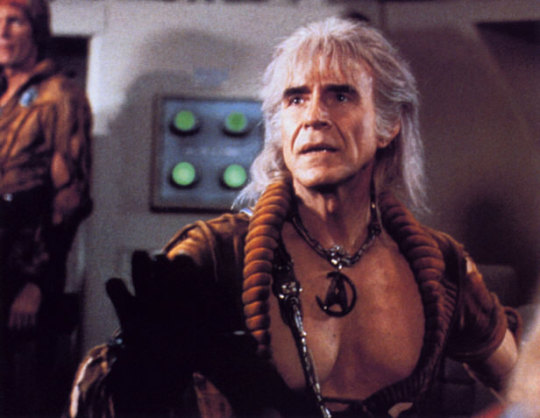

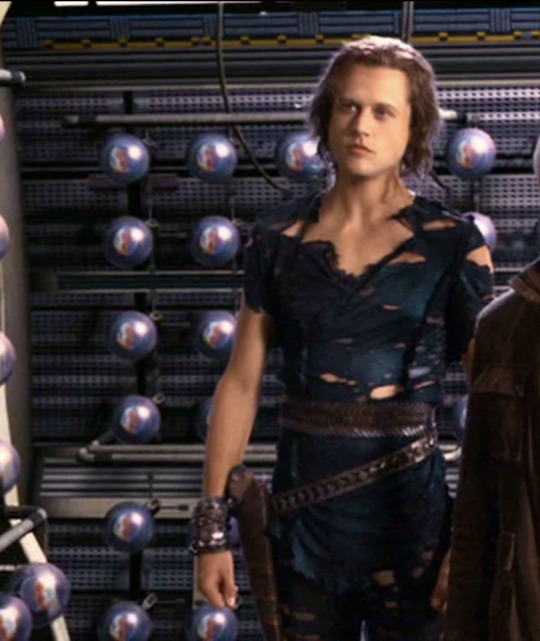
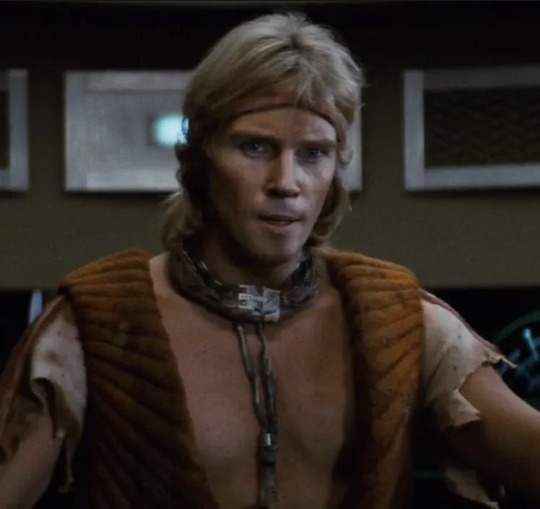
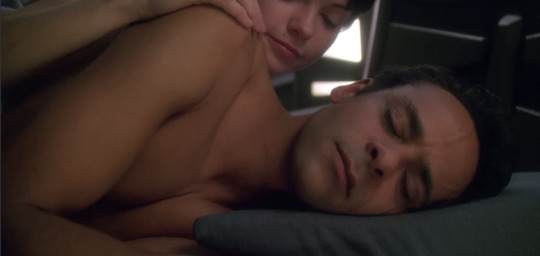

they DON'T. (come on, you know I'm right.)
(for context, half these people have literally just escaped being marooned on a desert planet. They *haven't* been shaving)
EDIT: I tried to post some photos of Kirk, Spock, McCoy, Riker, Picard, and a bunch of the guys from Enterprise as a point of comparison, because all of them demonstrably DO have body hair. But that was just too sexy for the Mature Audience filter, so just. Know that's a thing, I guess.
#star trek#augments#khan noonien singh#malik ent#joachim star trek#khan's crew#space seed#wrath of khan#star trek meta#garashir#fanfiction recs#star trek ds9#julian bashir
299 notes
·
View notes
Text
I'm so obsessed with Jack. He's such a random background character in ds9 but I'm IN LOVE WITH HIM.
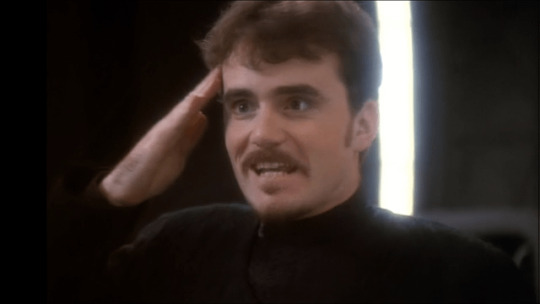
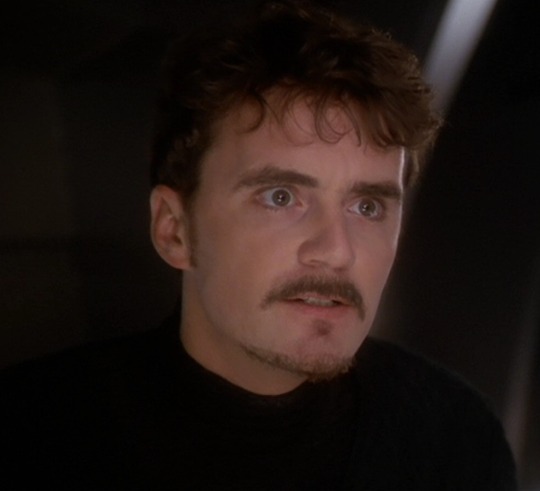
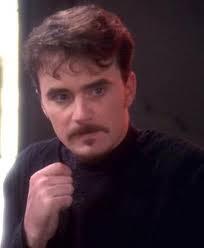
MY HUSBAND IS SO CUTE I LOVE HIM SM 😭😭 I WANT HIM SO BAD
61 notes
·
View notes
Text
Wonderful art for Chapter 4 of Proprietary Heart by @red-deer-art
@murderbotbigbang

I peered at the augments. One of my drones moved in for a closer look. I’d always assumed Gurathin’s augments were bespoke—I don’t even know why? Perhaps because he seems sort of unique, unlike any other augmented human I’ve met? But close up now I could see they bore a close resemblance to company tech. There were no visible logos, but perhaps he’d had them removed (I know I would, if I could). I was examining a tiny sensor when he woke up, unexpectedly. His eyes sprang open.
Story has seven chapters, and one bonus chapter of meta! Publishing dates for remaining chapter:
Chapter 5–18th October
Chapter 6–20th October
Chapter 7–22nd October (completes the story!)
Chapter 8–24th October Meta!
#murderbot#the murderbot diaries#murderbot diaries#gurathin#secunit#gurathin my beloved#murderathin#fan art#augments#dr. gurathin#Murderbot big bang 2024#Murderbot big bang
12 notes
·
View notes
Text
Eugenics in Star Trek: a Disabled Perspective on Genetic Augmentation
Not the essay I wanted to write, to be honest, but I was scrolling through the DS9 tag and violently reminded of the dubiousness that Augments are treated with by the writers. It has never sat right with me how Augments get treated, both in-universe and by writers.
So let me start by pointing out that I think some of the Augment storylines were really well-written, and others sucked. Enterprise's Augment storyline sticks out as the absolute worst of the bunch, though apparently that was one of the better-received storylines. But I digress.
The problem with Augments is that, of course, their concept is based in eugenics. They're established in Space Seed to be remnants of a worse time on earth, people "improved" so much by genetic alteration that they believe themselves to be the superior humans, going so far as to wish to kill other humans. They're a very clear reason why genetic augmentation as a whole was banned on earth, later carrying over to Federation law as well.
This includes ALL forms of genetic augmentation, with no nuance. This becomes especially clear when it comes to Illyrians, who are banned from joining the Federation and Starfleet despite arguably genetically augmenting their own bodies for a noble purpose.
In Deep Space Nine, this culminates in Julian Bashir having to hide his status as an Augment to be able to have a career. It's clearly a sore point for him, and he really struggles with the concept of his authenticity as a person. I'm reminded of the one post talking about how Kukalaka, his teddy bear, serves as a physical reminder that even before his father took him to be augmented, he was fixing up or "healing" his teddy bear when it was broken or "sick", that becoming a doctor was in that sense the only path that felt authentic to his personality.
The other Deep Space Nine Augment storyline involves Julian's efforts to help a group of Augments who came out of the process still "defective". Which is still a great storyline in my opinion, despite its flaws.
And I understand that the Federation attitude towards Augments is an example of an idealistic society that isn't flawless, which is in many ways what DS9 represented as a whole. So I feel the storyline is very much relevant to the series.
Still, the issues it (and later Augment storylines) presents are painful to watch, especially as a disabled person whose struggles are largely genetic issues exacerbated by their interaction with one another in my body.
In the first place, while I understand the decision to outlaw genetic modification as planet earth, or even as the Federation, because I understand why the decision was made, I don't feel that that's a proportional response to what happened in the past. As mentioned before, even beneficial genetic augmentations are banned, as seen with the Illyrians. That means that for people with genetic diseases cannot get meaningful help in a time and place where that should definitely be possible.
Looking at what I experience, should I be expected to consume painkillers my entire life? Physical therapy twice a week to keep up the strength in my muscles? Spend time having ligaments and tendons regenerated every so often? When a small genetic alteration could be a cure that doesn't require repeating? Degenerative diseases and conditions will degenerate if you don't continuously control them, even in the utopia of Star Trek.
So in the first place, the complete disallowance of genetic augmentation in the Federation is harmful. But then what do you do with people who were augmented either way, as a humane and just society? Especially when they didn't have a choice in the matter because they were a child? Do you accept them and take care of them, recognising that if you teach a child it is fundamentally different and therefore deserving of ostracisation and scorn, it will start to hate those who are different from it? Will you allow them to lead normal lives, with normal careers, like normal people? Will they be allowed to have children and start families, like normal people? Will you allow them the dignity of a peaceful life?
No, why would you? The ones that turn out poorly are tossed into a hole and forgotten about! The ones that turn out well you presumably don't hear about, because they can hide it better! Ignore the problem exists, why not? Whatever could go wrong?
Which then also becomes difficult to watch as a disabled person, because that's what the "failed" Augments are, they're disabled. Whether they display autistic traits or OCD symptoms or other mental (or physical) impairments, they are disabled. They may or may not have been disabled before their augmentation, but they certainly are now. And so their treatment becomes an issue of how the Federation treats its disabled citizens. And the answer seems to be: not very well!
So the ongoing storylines with Augments, and the 'organic android' storyline in Picard season 1, are two different sides of what is essentially only a debate on disability rights, and whether or not we deserve to exist. It's a conversation that gets so little nuance from the shows, but one that requires it.
The show could have gone the nuanced route. Legalise genetic augmentation so you can regulate it. Outlaw the modification of children and those who cannot consent. Give people the choice to change their bodies, should they desire or see a need to. The better you regulate it, the more you can prevent cases like the people in DS9, the more you can use the techniques to help people, the less you ostracise the people who did get augmented or who would like to get augmented.
But instead, all sides of the conversation within the series are advocating for eugenics, for genocide. Khan and his Augments, wanted to eradicate non-Augments, who they see as lesser, as inhibited, as small. Richard Bashir, and presumably the parents of the other augments, wanted to get rid of their children's disabilities and impairments. And the Federation is trying to eradicate Augments, by denying them lives, livelihoods, by ostracising and scorning them and throwing those you can visibly tell are different into a cell somewhere you don't have to think about them.
And I, as a disabled person, would simply like to watch Star Trek without being reminded that people would want me dead.
#star trek#star trek deep space nine#star trek ds9#ds9#augments#julian bashir#genocide mention#eugenics mention#genetic augmentation#khan noonien singh#star trek tos#essay
82 notes
·
View notes
Text

"This job just got too big for you, little rogue" Finished the character sheet for Chain GnashHead, a rival, top notch mercenary whose temper runs as hot as her augments.
#character design#monster girl#augmented#augments#my oc#oc#character sheet#female character design#dog girl#axe#scifi#furry character#cyberpunk#dieselpunk#anthro#anthro art#furry
29 notes
·
View notes
Text
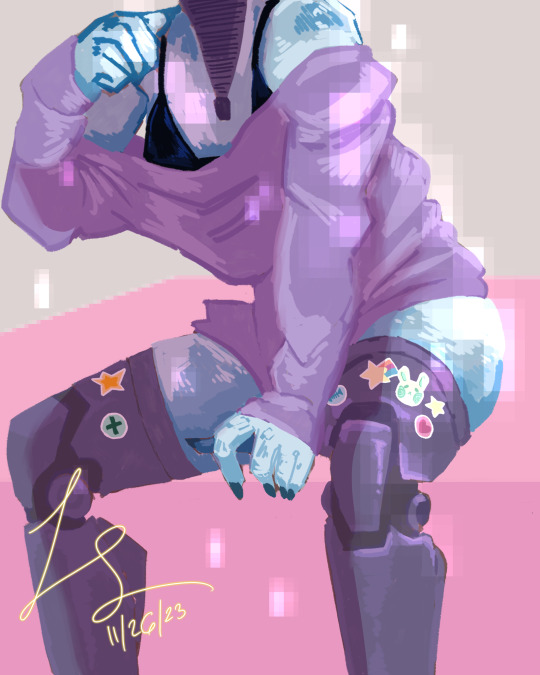
Felt cute, might delete later
#lancer#lancer rpg#lancer oc#augments#augmented#body mods#cute selfie#oc artwork#art#digital painting#digital art
34 notes
·
View notes
Text

#1125
i feel like people forget the original ocntext behind the depiction of genetically augmented people in star trek, mostly when arguing that julian is/was mistreated, which is think is part of fandom's sometimes troubling tendency to over-empathise with the characters in their favourite ships and forget/ignore other important aspects of the work. ds9 kinda started this, with depicting julian as being a victim of his parent's meddling, and giving us a muddled picture of augmentation as both a cure for disability but also a cause for it. and then nu-trek gave us the stories of una and dal, in which anti-augment sentiment is explicitly framed as institutional bigotry against a minority group. but tos was made in the 60's, with its creator and many of its writers and older actors had fought in WWII. george takei had grown up in an internment camp because of america's racist policies. khan was a fascist, and he and his people were created through eugenics. they were very explicitly patterned after the nazis, and that's the lense star trek originally processed them through, including the other characters in ds9.
#confession 1125#star-trek-fandom-confessions#star trek#augments#julian bashir#deep space nine#strange new worlds#una chin riley#dal r'el#star trek prodigy#the original series#george takei#khan noonien singh
74 notes
·
View notes
Text
the real reason augments should not join starfleet is because they will be forced to wear turtlenecks. with pips on them.
#I get secondhand itching just looking at them#Jack wears a turtleneck but he’s inches away from overstimulation at all times#so my point still stands#ds9#star trek#starfleet#augments#ds9 statistical probabilities#star trek shitposting#how do you live in a post-clothingtag society and then turn around and invent the Neck Tickler
5 notes
·
View notes
Text
Episode 223: Julian Creeps and the Rio Grande
DS9: "Chrysalis" and "Treachery, Faith, and the Great River"
It's one of those magic SSHB weeks where a pile of trash is joined by something genuinely good. First up: the augments are back but Sarina has been retconned so she can become yet another of Bashir's patient/love interests in "Chrysalis"! Gross! After that, a Weyoun has defected, but is he really defective? Find out in "Treachery, Faith, and the Great River"!
Also this week: Pedants the Podcast, Space Flowers for Space Algernon, and treading familiar ground.
Timestamps: Chrysalis: 2:09; Great River: 42:17
#star trek#star trek podcast#podcast#deep space nine#star trek ds9#chrysalis#treachery faith and the great river#ben sisko#kira nerys#ezri dax#julian bashir#miles o'brien#quark#odo#worf#jake sisko#sarina douglas#augments#genetically modified#nog#weyoun#changelings#SoundCloud
2 notes
·
View notes
Text




A Mechanic's Sketchbook
Cyborg repairs — a visual troubleshooting log. Routine. Totally professional…
Text transcript available at AO3 mirror.
#cyborgs#cyborg#cyborg kink#robot kink#robophilia#eroticism of the machine#sketches#fluff#augments#cyberpunk#cyberpunk art
6 notes
·
View notes
Text

... I could fix him
#star trek#star trek tos#khan#khan noonien singh#the wrath of khan#wrath of khan#art#my art#fanart#my fanart#khan fanart#augments
12 notes
·
View notes
Text
More musings on utopia and the Federation as narrative device
The more I think about the streaming era of Star Trek, and Strange New Worlds kind of rubs our nose in the point, is that the point of the Federation was never to depict a perfect society. That would be narratively pointless.
What makes the Federation a great society is that it’s members are not perfectly ethical or aware of every salient fact at all times, but when they realize they’re wrong, they quickly pivot to the correct choice rather than go to their grave rationalizing why it’s okay to genocide a species it can’t directly perceive to improve the power and lifestyle of the Federation.
Critical decision makers in the Federation are capable of abdicating their moral duty to those in need out of fear or spite, but they are just as capable of swiftly moving to recognize the validity of very different life when given the correct information.
Anyone who has spent more than a few minutes online I suspect can recognize the magnitude of what it means simply to being open to changing one’s mind and admitting responsibility for allowing something heinous to happen. To not waste time making excuses and ensuring everyone knows you didn’t know any better rather than acting to solve the problem. To feel a responsibility for righting a situation you didn’t cause but did inherit and perhaps even benefit from.
If the average Starfleet officer has a superpower, it’s not that they’re super humanly more empathetic or have had the instinct for bigotry or selfishness purged entirely, it’s that their ego is just a smidge less aggressive. It’s not so overpowering that when confronted with irrefutable evidence of wrong doing, that they’ve failed to be the person Jean luc Picard knows they can be, that they can admit fault, and seek to right a wrong.
The Federation, for all the faults exposed by Discovery, Strange New Worlds, and Picard, is not a place that would rewrite textbooks to say that American style chattel slavery was no big deal in order to avoid feeling bummed out or obliged to address second order consequences of a historical wrong. Rather than say the Synths are exaggerating or their sentience is a clever fake, over a decade of policy is overturned almost immediately in the face of proof the Federation was wrong.
A very good episode is a tour of Plato’s cave. Moving from ignorance to knowledge but crucially when the one who has seen the outside returns, they are not rejected by their peers. The others don’t choose the comfort of their shadow puppets.
#star trek#star trek ethics#dystopia#utopia#the United federation of planets#Starfleet#strange new worlds spoilers#Picard#christopher pike#nyota uhura#una chin riley#augments#synths
12 notes
·
View notes
Text
#khan noonien singh#una chin riley#number one#julian bashir#dal r'el#genetic engineering#starfleet#augments#the eugenics war#star trek tos#star trek the original series#star trek ii: the wrath of khan#star trek snw#star trek strange new worlds#star trek deep space nine#star trek ds9#star trek prodigy#star trek pro#star trek#movies#tv shows#sci fi#paramount plus#game rant
1 note
·
View note